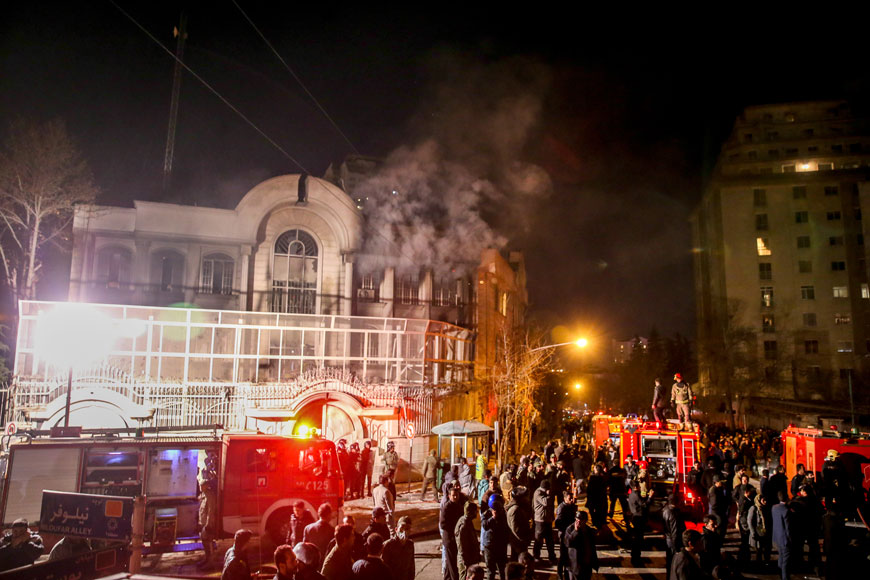DUBAI/RIYADH — Saudi Arabia said on Sunday it had severed ties with Iran over the storming of its embassy.
Foreign Minister Adel Al Jubeir told a news conference that Iran’s diplomatic mission and related entities in Saudi Arabia had been given 48 hours to leave. He said Riyadh would not allow Tehran to undermine Saudi security.
Iranian protesters stormed the Saudi embassy in Tehran early on Sunday and Shiite Muslim Iran's top leader predicted "divine vengeance" for Saudi Arabia's execution of a prominent Shiite cleric.
Strong rhetoric from Tehran was matched by Iran's Shiite allies across the region, with Sayyed Hassan Nasrallah, the head of Lebanese militia Hizbollah, describing the execution as "a message of blood".
Moqtada Al Sadr, an Iraqi Shiite cleric, called for angry protests.
Tensions between revolutionary, mainly Shiite Iran and Saudi Arabia's conservative Sunni monarchy had already run high for years as they backed opposing forces in wars and political conflicts across the Middle East, usually along sectarian lines.
However, Saturday's execution of a cleric whose death Iran had warned would "cost Saudi Arabia dearly", and the storming of the kingdom's Tehran embassy, raised the pitch of that rivalry.
Demonstrators protesting against the execution of Sheikh Nimr Al Nimr broke into the embassy building, smashed furniture and started fires before being ejected by police.
Iran's President Hassan Rouhani condemned the execution as "inhuman", but also urged the prosecution of "extremist individuals" for attacking the embassy and the Saudi consulate in the northeastern city of Mashhad, state media reported.
Tehran’s police chief said an unspecified number of “unruly elements” were arrested for attacking the embassy with petrol bombs and rocks. A prosecutor said 40 people were held.
“The unjustly spilled blood of this oppressed martyr will no doubt soon show its effect and divine vengeance will befall Saudi politicians,” Iran’s Supreme Leader Ayatollah Ali Khamenei was quoted as saying by Iran’s state television.
Iran’s Revolutionary Guards had promised “harsh revenge” against the Saudi Sunni royal dynasty for the execution of Nimr, considered a terrorist by Riyadh but hailed in Iran as a hero of the rights of Saudi Arabia’s marginalised Shiite minority.
However, the Saudi and Iranian foreign ministers told Austria they have no interest in a further of heightening tensions between them, a spokesman for Austria’s Foreign Minister Sebastian Kurz said.
Protests
Nimr, the most vocal critic of the dynasty among the Shiite minority, had come to be seen as a leader of the sect’s younger activists, who had tired of the failure of older, more measured leaders to achieve equality with Sunnis.
His execution sparked angry protests in the Qatif region in eastern Saudi Arabia, where demonstrators denounced the ruling Al Saud dynasty, and in the nearby Gulf kingdom of Bahrain.
Relatives of Nimr, reached by telephone, said authorities have informed them that the body had been buried “in a cemetery of Muslims” and would not be handed over to the family.
Although most of the 47 men killed in the kingdom’s biggest mass execution for decades were Sunnis convicted of Al Qaeda attacks in Saudi Arabia a decade ago, it was Nimr and three other Shiites, all accused of involvement in shooting police, who attracted most attention in the region and beyond.
Khamenei’s website carried a picture of a Saudi executioner next to notorious Daesh executioner “Jihadi John”, with the caption “Any differences?”. The Revolutionary Guards said “harsh revenge” would topple “this pro-terrorist, anti-Islamic regime”.
Saudi Arabia on Saturday summoned the Iranian ambassador to protest what it described as hostile remarks emerging from Tehran. On Sunday, Riyadh’s Gulf allies the United Arab Emirates, Kuwait and Bahrain also summoned Tehran’s envoys to their countries to lodge complaints.
Iraq also furious
In Iraq, whose Shiite-led government is close to Iran, religious and political figures demanded that ties with Riyadh be severed, calling into question Saudi attempts to forge a regional alliance against Daesh, which controls swaths of Iraq and Syria.
Iraq’s top Shiite cleric Grand Ayatollah Ali Al Sistani described the executions as an “unjust aggression”. The opinion of Sistani, based in the Shiite holy city of Najaf south of Baghdad, carries weight with millions of Shiites in Iraq and across the region, including in Saudi Arabia.
Despite the focus on Nimr, the executions seemed mostly aimed at discouraging jihadism in Saudi Arabia, where dozens have died in the past year in attacks by Sunni militants.
But Saudi Arabia’s Western allies, many of whom supply it with arms, are growing concerned about its new assertiveness.
The US State Department said Nimr’s execution “risks exacerbating sectarian tensions at a time when they urgently need to be reduced”, a sentiment echoed by EU foreign policy chief Federica Mogherini.
The State Department also urged Saudi Arabia to respect and protect human rights.
France said on Sunday it deeply deplored the mass execution and said it reiterated its opposition to the death penalty in all circumstances.
In Istanbul, hundreds of protesters, some carrying pictures of Nimr and chanting “Saudi Arabia will pay the price”, gathered outside its consulate on Sunday as riot police stood guard.
The four Shiites had been convicted of involvement in shootings and petrol bomb attacks that killed several police during anti-government protests from 2011-13. More than 20 Shiites were shot dead by the authorities in those protests.
Family members of the executed Shiites have denied they were involved in attacks and said they were only peaceful protesters against sectarian discrimination.
Human rights groups say the kingdom’s judicial process is unfair, pointing to accusations that confessions have been secured under torture and that defendants in court have been denied access to lawyers. Riyadh denies torture and says its judiciary is independent.
